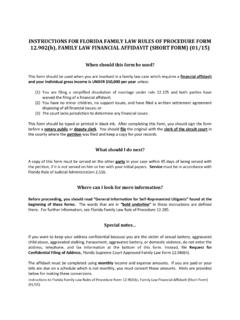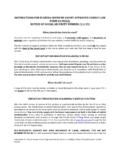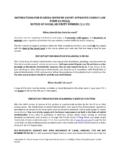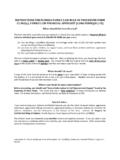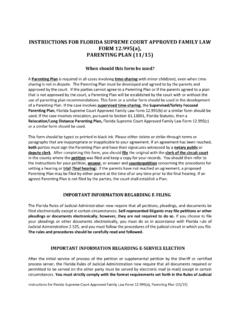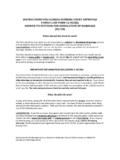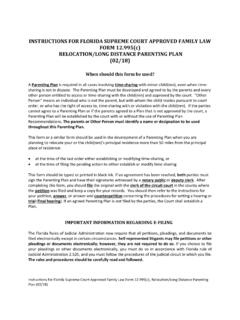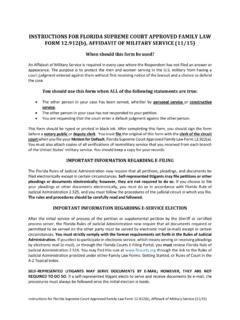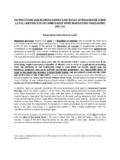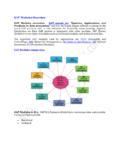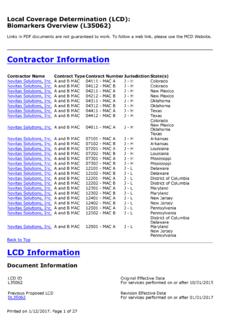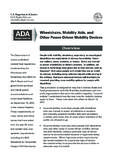Transcription of CANDIDATE WRITTEN EXAMINATION OVERVIEW
1 CANDIDATE WRITTEN EXAMINATION OVERVIEW CONSORTIUM FOR LANGUAGE ACCESS IN THE COURTS Staff of the [Florida] Office of the State Courts Administrator has adapted the contents of this manual to reflect State specific policies and procedures. Last updated June 18, 2013 [This page intentionally left blank]. Introduction This document has been prepared to help persons aspiring to become certified court interpreters understand what the WRITTEN test measures, how it is administered, and how to prepare for taking the exam. Each examinee should study this OVERVIEW thoroughly in order to be more fully prepared for the WRITTEN exam. The WRITTEN EXAMINATION is only one part of the process for becoming a certified or approved court interpreter (designation varies by state).
2 Passing this test does not mean a person has become a certified or qualified court interpreter ; rather, it means the examinee has met one of several requirements for either certification or qualification (again, requirements and policies vary by state). State policy in Florida requires candidates to achieve a passing score on the WRITTEN exam for eligibility to take the Oral Performance EXAMINATION , and/or attend any State sponsored skill building workshops. The WRITTEN test measures candidates' knowledge of three areas central to the work of a court interpreter at the level of a minimally qualified court interpreter: 1. English Language. To function as a professional court interpreter, one indispensable component is a high degree of proficiency in the English language.
3 Accordingly, the WRITTEN EXAMINATION assumes a high degree of literacy in the English language and familiarity with a range of language constructions. It tests comprehension of WRITTEN English vocabulary and idioms. 2. Court Related Terms and Usage. A second area of knowledge essential to successful professional performance is familiarity with the terminology and procedures of the court system. Accordingly, the WRITTEN EXAMINATION also measures recognition of common court . related situations and vocabulary, especially in the area of criminal courts. 3. Ethics and Professional Conduct. The third area of knowledge required of professional court interpreters encompassed in the WRITTEN test is general knowledge of standards guiding the performance of duties.
4 Accordingly, the WRITTEN exam includes questions aimed at measuring candidates' knowledge of ethical behavior and professional conduct. What does the test look like? The EXAMINATION contains 135 multiple choice questions. Each question has four choices, labeled A, B, C, and D. The CANDIDATE is instructed to select the best choice and mark that choice on the answer sheet (the specific form of the answer sheet will vary by state). 1 The test has two parts: Part I: General Language Proficiency (75 questions), and Part II: Court Related Terms & Usage, and Ethics & Professional Conduct (60 questions). Within each part, there are several sections, each of which contains a particular category of questions. There are specific instructions for how to proceed at the beginning of each section.
5 A complete list of the sections, including one or more sample questions for each, is provided in Appendix A. How will the test be scheduled and what do I need to know about the test in advance? An official of the state where you are taking the exam will notify you in writing by mail or email. Time frames vary from state to state. The notice will advise you when and where to report for the test and may include directions to the test site. Arrive early. No one will be admitted late. There are no exceptions and no one arriving late for any reason will be able to take the test at that test session. Only small purses or wallets are allowed in the testing room. Leave everything else at home or in your car. Do not try to bring briefcases, palm pilots, dictionaries, gym bags, cell phones, calculators, paper, pens, pencils, or any other similar items into the test room as you will not be admitted to the test room with them.
6 Pencils will be provided in the test room. Before the WRITTEN EXAMINATION , you will be instructed to empty and turn your pockets inside out to confirm that you have no prohibited items. There may be a registration area where you will report and sign in. In the testing room, there will be a test administration supervisor, and there may be other test proctors present to assist. Use the restroom prior to entering the testing room. If you ask to leave the testing room after the test has begun, you will be instructed to leave all of your test materials with the test administration supervisor prior to leaving the room. You may be escorted to the restroom to ensure that you do not use a telephone or converse with other individuals while you are outside of the testing room.
7 No more than one CANDIDATE will be allowed to leave the testing room at the same time. No adjustments to the time allotted for completion of the exam will be made for any time you are outside of the testing room. What if I need special accommodation due to a disability? If you have a disability recognized by the Americans with Disabilities Act (ADA), you must request special accommodation in advance. In order to do that, you should contact the court interpreter program administrator as far ahead of the test date as possible, who will provide 2 you with test accommodations guidelines and a petition checklist, which details the specific policies for determining whether to grant accommodations on the EXAMINATION , as well as the requisite documentation needed for review and evaluation.
8 How will the test be administered? The administration protocol, described below, is recommended practice. It is specifically noted here that from state to state, there may be some deviation from the exact recommendation. However, the protocol described will, in large part, reflect administration practices. In most states, the test will be given in classroom style to a number of candidates at the same time in the same room. A test administration supervisor, who is responsible for oversight of the entire test administration process, will decide what staff members are present to assist with proctoring the EXAMINATION . Seating will be assigned. Depending upon the seating arrangements, some candidates may be asked to move from one seat and occupy another.
9 If this happens, it is for test security measures and the candidates should not be troubled or concerned. Security of the test materials is obviously essential. Examinees may not take notes or copy any portion of the exam. Proctors will monitor candidates throughout the EXAMINATION to prevent cheating and, if cheating occurs, detect and deal with it. They may circulate throughout the room, but they will not disturb the examinees. If a proctor suspects that an examinee is cheating in any way, including giving or receiving assistance during the EXAMINATION , communicating with others, retaining or copying EXAMINATION questions, or using prohibited aids, the proctor will follow specific protocol for addressing the situation. If an examinee is disruptive, engages in clear or flagrant cheating, or attempts to copy questions or retain or record test materials, the examinee may be expelled from the testing room and advised that his or her EXAMINATION will not be scored.
10 Documentation of the expulsion and the reasons for it will be maintained by the state. Once all examinees are seated for the exam, the test administrator will hand out materials packets and two pencils to each person. He or she will read instructions scripted to the examinees in order to ensure that all candidates receive the same instructions each time the EXAMINATION is given. Then the examinees will be directed to read and execute an Agreement and Oath Form. Next, examinees will prepare their answer sheets by entering their name and social security number, the test date, and the test site. Examinees must listen to the instructions carefully and must not begin the EXAMINATION until the test administration supervisor says, You may begin.
